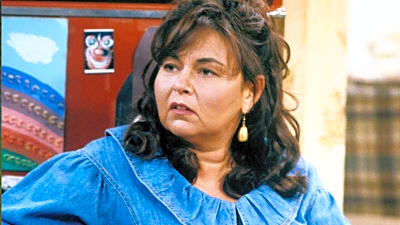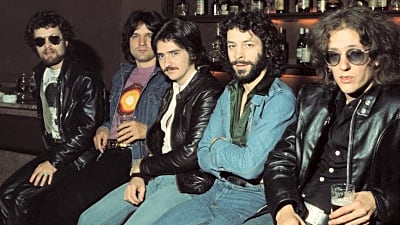- Home
- Quizzes
- My Quiz Activity
- Newsletters
- MY FAVORITES
- Add Sports/Teams
- SPORTS
-
NFL
- NFL Home
- Arizona Cardinals
- Atlanta Falcons
- Baltimore Ravens
- Buffalo Bills
- Carolina Panthers
- Chicago Bears
- Cincinnati Bengals
- Cleveland Browns
- Dallas Cowboys
- Denver Broncos
- Detroit Lions
- Green Bay Packers
- Houston Texans
- Indianapolis Colts
- Jacksonville Jaguars
- Kansas City Chiefs
- Las Vegas Raiders
- Los Angeles Chargers
- Los Angeles Rams
- Miami Dolphins
- Minnesota Vikings
- New England Patriots
- New Orleans Saints
- New York Jets
- New York Giants
- Philadelphia Eagles
- Pittsburgh Steelers
- San Francisco 49ers
- Seattle Seahawks
- Tampa Bay Buccaneers
- Tennessee Titans
- Washington Commanders
-
MLB
- MLB Home
- Athletics
- Arizona Diamondbacks
- Atlanta Braves
- Baltimore Orioles
- Boston Red Sox
- Chicago White Sox
- Chicago Cubs
- Cincinnati Reds
- Cleveland Guardians
- Colorado Rockies
- Detroit Tigers
- Houston Astros
- Kansas City Royals
- Los Angeles Angels
- Los Angeles Dodgers
- Miami Marlins
- Milwaukee Brewers
- Minnesota Twins
- New York Yankees
- New York Mets
- Philadelphia Phillies
- Pittsburgh Pirates
- San Diego Padres
- San Francisco Giants
- Seattle Mariners
- St. Louis Cardinals
- Tampa Bay Rays
- Texas Rangers
- Toronto Blue Jays
- Washington Nationals
-
NBA
- NBA Home
- Atlanta Hawks
- Boston Celtics
- Brooklyn Nets
- Charlotte Hornets
- Chicago Bulls
- Cleveland Cavaliers
- Dallas Mavericks
- Denver Nuggets
- Detroit Pistons
- Golden State Warriors
- Houston Rockets
- Indiana Pacers
- Los Angeles Clippers
- Los Angeles Lakers
- Memphis Grizzlies
- Miami Heat
- Milwaukee Bucks
- Minnesota Timberwolves
- New Orleans Pelicans
- New York Knicks
- Oklahoma City Thunder
- Orlando Magic
- Philadelphia 76ers
- Phoenix Suns
- Portland Trail Blazers
- Sacramento Kings
- San Antonio Spurs
- Toronto Raptors
- Utah Jazz
- Washington Wizards
-
NHL
- NHL Home
- Anaheim Ducks
- Boston Bruins
- Buffalo Sabres
- Calgary Flames
- Carolina Hurricanes
- Chicago Blackhawks
- Colorado Avalanche
- Columbus Blue Jackets
- Dallas Stars
- Detroit Red Wings
- Edmonton Oilers
- Florida Panthers
- Los Angeles Kings
- Minnesota Wild
- Montreal Canadiens
- Nashville Predators
- New Jersey Devils
- New York Islanders
- New York Rangers
- Ottawa Senators
- Philadelphia Flyers
- Pittsburgh Penguins
- San Jose Sharks
- Seattle Kraken
- St. Louis Blues
- Tampa Bay Lightning
- Toronto Maple Leafs
- Utah Mammoth
- Vancouver Canucks
- Vegas Golden Knights
- Washington Capitals
- Winnipeg Jets
- NCAAF
- NCAAM
- Olympics
- Boxing
- Entertainment
- Lifestyle
- Golf
- MMA
- Soccer
- Tennis
- Wrestling
- Sports Betting
- More Sports
- RESOURCES
- My Account
- YB on Facebook
- YB on Twitter
- YB on Flipboard
- Contact Us
- Privacy Policy
- Terms of Service

25 actors who play characters you love to hate
There are actors who excel at one-note monstrousness and others who can play the whole keyboard. The latter performers are valuable commodities in Hollywood. Sometimes they get typecast for being too good at being bad; other times, they strike a tonal balance that allows them to dip in and out of villainous roles. These actors who dazzle us with their capacity for loathsomeness, who make us drop the remote when they enter a scene, are special. Throughout film history, there have been maybe a few dozen who can keep us watching when the worst is about to happen. Here are 25 of the most lovably hatable actors of all time.
Paul Gleason
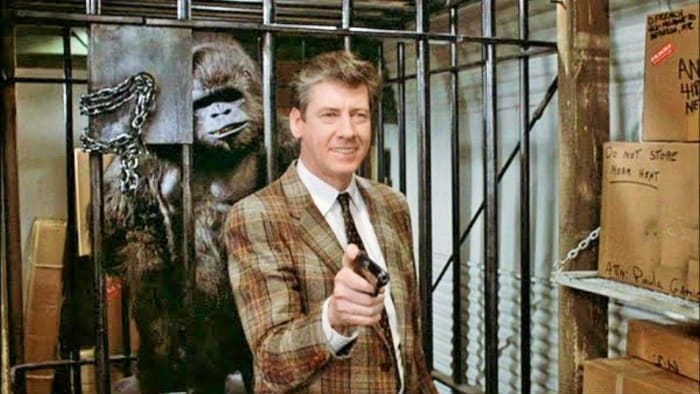
“Don’t mess with the bull, young man. You’ll get the horns.” Paul Gleason was rounding into form as a dependable character actor in the early 1980s when he hit prickly paydirt as bagman Clarence Beeks in “Trading Places." Over the next decade, Gleason was Hollywood’s go-to jerk, and he was glorious. He’s officious perfection as Principal Richard Vernon in “The Breakfast Club," deliciously vituperative coach Wayne Hisler in the otherwise wretched “Johnny Be Good," contentiously incompetent as deputy chief Dwayne T. Robinson in “Die Hard” and skeevily corrupt in “Miami Blues." He capped his run off with a lovely piece of self-parody in “Loaded Weapon 1." We lost him way too soon at the age of 67, right when it appeared a Gleasonance was upon us with his throwback turn in “Abominable."
James Spader

James Spader kicked off his career as the fresh-faced protagonist of “The New Kids” and “Tuf,"Turf”, but he didn’t pop until he became the embodiment 1980s yuppie scum spawn as Steff in “Pretty in Pink." Though his best performances of this era were complex portraits of young male disillusion in films like “Sex, Lies, and Videotape” and “White Palace," his brief performances as a scumbag coke dealer in “Less Than Zero” and a nepotism law firm hire in “Wall Street” were the ones that left the deepest groove in mainstream pop culture. He bounced back and forth between white-collar villainy (“True Colors”, “Wolf”) and earnest heroes (“Stargate," “Critical Care”) before ultimately playing a charismatic, Hannibal Lecter-esque criminal mastermind on the long-running NBC drama, “The Blacklist."
Louise Fletcher

Louise Fletcher’s brilliant career should not be reduced to Nurse Ratched, but the placid cruelty of that smile is the most efficacious display of indomitable authority ever recorded by a camera. Fletcher’s career is an intriguing tightrope walk between prestige television and B movies. She’s hugely sympathetic as a compromised scientist in “Brainstorm” and the mother of an underdog martial artist in “Best of the Best." But when she sinks her teeth into a malevolent character — as she did with the schoolteacher in Tobe Hooper’s unjustly maligned “Invaders from Mars," and the sternly proscriptive grandmother in “Flowers in the Attic” you’re in for a treat.
John Vernon

“National Lampoon’s Animal House” would’ve been nothing more than a loosely strung together collection of outrageous campus antics without John Vernon as the absurdly stern Dean Vernon Wormer. His fun-crushing vindictiveness and vanity give the film an anti-authoritarian charge that it really doesn’t deserve. (The Deltas are little more than entitled white kids who don’t want the party to end.) This may be the apex of Vernon’s villainy, but those in the know had been hate-loving the man with the menacing voice since he gunned down Lee Marvin at the outset of “Point Blank." Other highlights: the soft-on-crime mayor in “Dirty Harry," the corrupt bank manager in “Charley Varrick," the Union captain tracking down “The Outlaw Josey Wales," the sadistic women’s prison warden in “Chained Heat”… Vernon left a splendid legacy of hiss-worthy baddies, and we are forever in his despicable debt.
Vic Morrow

A heroic figure on television (most memorably in the hit ABC series “Combat!”), Morrow excelled as a villain on the big screen. He made an indelible debut as the switchblade-wielding Artie West in “Blackboard Jungle”, and followed that up with more stab-happy fun as the vicious gang leader Shark in the Elvis Presley vehicle, “Kid Creole." Those who’ve seen “Portrait of a Mobster” swear the Bronx-bred Morrow was a magnificently nasty Dutch Schultz. But if you’re looking for Morrow in his bristly prime, go straight to “The Bad News Bears” where he plays a loathsome Little League dad who drives his son to sabotage a commanding lead in the championship game.
William Atherton

If Paul Gleason had the market cornered on blustery buffoons in the 1980s, William Atherton was your first call if you needed an overbearing, eggheaded doofus. He was fast-tracked as a leading man in ‘70s in “The Sugarland Express," “The Day of the Locust” and “The Hindenburg” (and he’s quite good in all three movies), but he hit the big time as a villainous EPA bureaucrat (again, it was the ‘80s) in “Ghostbusters." He was a terrific foil for Murray’s blissfully incompetent scientist and parlayed that into his finest big-screen performance as the exploitative professor Jerry Hathaway in “Real Genius" ("You're laborers. You're supposed to be laboring. That's what you get for not having an education."). He went ultra-unctuous as an unethical TV reporter in “Die Hard," took a victory lap two years later in “Die Hard 2” and has generally worked variations on these characters throughout his career.
Judith Anderson

She's the OG villain you love to hate — though it’s reductive to call Judith Anderson’s Mrs. Danvers a “villain” per se. She’s a victim of circumstance. She was loyal to Rebecca de Winter, and resents her employer, Maximilian de Winter, for having remarried. Hitchcock was famously undermined by his heavy-handed producer, David O. Selznick, so it’s hard to determine authorship on this one, but as one of the greatest stage actors of her generation, Anderson casts a soulful chill across "Rebecca" that overwhelms the work of Laurence Olivier and Joan Fontaine. Hitch must’ve loved her severe countenance, but you get the sense that the director and the producer had no intention of her stealing the movie. Sorry, boys. This is Anderson’s movie through and through.
Alan Rickman

Alan Rickman was, by all accounts, a warm presence on the set of a film or the backstage of a play. This kindness radiates in some of his greatest performances — e.g. “Truly, Madly, Deeply," “Sense and Sensibility” and, in the series’ loveliest moment, “Harry Potter and the Deathly Hallows – Part 2." But unless you grew up in the U.K., you almost certainly fell in love with Rickman via his outlandishly charming portrayal of the common, nay exceptional, thief Hans Gruber in “Die Hard." Hollywood fell hard for him too. He was a hoot as the Christmas-canceling Sheriff of Nottingham in “Robin Hood: Prince of Thieves” and a fine mustache-twirling, quick-draw gunslinger in the underrated “Quigley Down Under." For multiple generations going forward, he’ll always be Severus Snape — and that’s a tremendous legacy to leave behind.
Richard Lynch

Richard Lynch’s big-screen breakthrough as the ominously ingratiating inmate Riley in “Scarecrow” left the poor guy typecast for life. It’s the kind of role many young actors would avoid, but the way Lynch flicks the switch from harmless drinking buddy to vicious sexual predator in that prison shop scene with a never-more-likable Al Pacino ensured he’d never go wanting for work. For most Gen X-ers, he’s probably best remembered as the delectably evil King Cromwell in “The Sword and the Sorcerer” or as terrorist Mikhail Rostov in the deliriously stupid Golan-Globus joint, “Invasion U.S.A.” His most underrated work might be in the curiously ambitious slasher film, “Bad Dreams," where Lynch drew on his own severe burn experience as cult leader Franklin Harris (and they might’ve had a franchise had they worked on that name a little).
Michael Ironside

If you’re going to get your head exploded telekinetically, accept no substitutes: Michael Ironside is your melon-blowing man. He’s one of our most dependable hard-cases: Jester in “Top Gun," Ham in “V”, Richter in “Total Recall” and Rasczak in “Starship Troopers." What you see with Ironside is precisely what you get: He has a resonant bass voice, a penetrating stare that cuts through you, and a physical solidity that you’d rather not test. But for the total Ironside experience, it’s Revok in “Scanners” or bust.
Billy Drago

He was the owner of one of the great do-not-touch faces in cinema. Drago was eight years into his career with some nifty bit parts to his credit (particularly “Cutter’s Way” and “Invasion U.S.A.”), but he broke through in a big way with that malevolent snarl of a smile as hitman Frank Nitti in Brian De Palma’s 1987 blockbuster, “The Untouchables." “Your friend died screaming like a stuck Irish pig.” It doesn’t get more chillingly evil than that. Drago might’ve been too effective in “The Untouchables." He never wanted for villain work, but when you saw him in a Z-grade flick like “Delta Force 2” or “Cyborg 2," all you could think of was Nitti. He did beautiful work in Takashi Miike’s “Imprint," which hinted at a career path desperate to branch in a different direction, but he could never escape Nitti.
Faye Dunaway

In the opening moments of “Bonnie and Clyde," Faye Dunaway writhes around on her bed seemingly waiting for someone to fulfill her deepest, darkest wishes. He arrives in the awkward form of Warren Beatty. He’ll do. Dunaway didn’t seem to care about being liked, let alone loved, and this made her one of the most exciting actors of the 1970s. She’s a femme fatale with several layers of hidden history in “Chinatown," a careerist TV news producer (because how else are you supposed to get ahead in a dude-dominated profession) in “Network” and a woman caught up in a web of espionage in “Three Days of the Condor." The roles got less interesting in subsequent decades, but she’s sensational as a worldly enabler in “Barfly” (because what fun is being a drunk if you don’t have a cohort) and a domineering dessert food executive in “The Temp." The great Dunaway performances leave bruises. You may not like the characters, but you love her for the emotional honesty.
Basil Rathbone

While Rathbone would eventually become synonymous with Sherlock Holmes in 14 films as the brilliantly deductive detective, he did most of his best big-screen work as a swashbuckling baddie. That sloping, pointed nose was just made for villainy, and he chewed up every last bit of scenery as Sir Guy of Gisbourne opposite the dashing Errol Flynn in “The Adventures of Robin Hood." As with Rickman half a century later, this was Rathbone’s gift: You walked out of the theater buzzing about the bad guy. Pasquale in “Mark of Zorro," Richard III in “Tower of London," Pontius Pilate in “Last Days of Pompeii," Ravenhurst in “The Court Jester”… Rathbone’s presence alone was worth the price of admission.
Ronny Cox

The New Mexico-born Ronny Cox had carved out a career as an amiable, folksy sort over the first 10 years of his career (thanks in large part to being one-half of the “Dueling Banjos” scene in “Deliverance”). Then he hooked up with Paul Verhoeven, who brought out a wanton cruelty in the man that had not been apparent in movies like “Taps” and “Vision Quest." The minute he tries to explain away ED-209’s ballistic explosion in “Robocop” as a “glitch," Cox barreled headlong into a largely unforeseen career as a corporate creep. Career-wise, Cox’s heel turn was a toe dip. But two “Robocop” films and a galactically evil turn in “Total Recall” (“Cohaagen!!!”) are nastiness aplenty.
Meg Foster
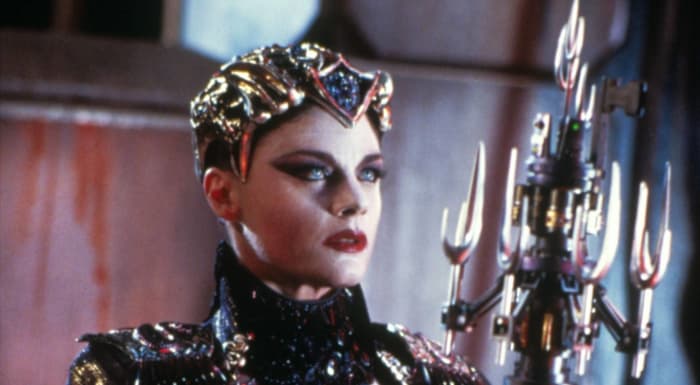
Meg Foster’s piercing blue eyes have a sinister quality that gave away the game. She always seemed two steps ahead of everyone else, and her intentions rarely seemed pure. You were on alert during “The Osterman Weekend” and “The Emerald Forest," but she didn’t find her fiendish footing until she hurled herself into the empty role of Evil-Lyn in “Masters of the Unvierse." There wasn’t much of a character, but Foster left an indelible mark, which brought her “They Live” (a tricky part that asked her to veer between hostile and sympathetic within minutes, all while working with a tyro dramatic actor in Roddy Piper) and “Leviathan” (much of which was played via a video uplink to the undersea crew). She was the epitome of the stylish, mid-‘80s villainess, and it would be a blast to see her back in the saddle.
Christopher Lee

Who would you rather have sucking the blood out of your neck: an inebriated Bela Lugosi or a fit-as-a-finely-tuned-fiddle Christopher Lee? The 6-foot-5 ladykiller was the Prince of Darkness, Frankenstein’s Monster, Dr. Fu Manchu, Lord Summersisle, Francisco Scaramanga, Doctor Catheter, Captain Wolfgang von Kleinschmidt, an MI5 agent in one magnificent scene in Gary Sherman’s “Raw Meat” and, probably, your illegitimate father. He was Christopher Lee. Evil never looked so damn good.
Kurtwood Smith

“C’mon, Sal! The Tigers are playing…tonight! And I never miss a game.” Kurtwood Smith had a handful of character actor credits to his name before he defined sadism for a generation as the unfathomably depraved cop killer Clarence Boddicker in Paul Verhoeven’s “RoboCop." He wasn’t quite as enjoyably evil in “Dead Poets Society” where he drove his son (Robert Sean Leonard) to suıcide because he deigned to play Puck in a production of “A Midsummer Night’s Dream," but he showed a lighter side of malevolence as a pro-life nutjob who runs a fake abortion clinic in Alexander Payne’s superb satire, “Citizen Ruth." Though best known nowadays as the lovably gruff Red on “That ‘70s Show," there was a time when Kurtwood Smith played with a serrated edge.
Margaret Hamilton

Aka Miss Almira Gulch aka The Wicked Witch of the West aka the lovely woman born in Cleveland, Ohio, who gave you nightmares throughout your childhood. Hamilton was so closely associated with her portrayal of the green-faced witch that children fled in terror when they saw her in public. The great Fred Rogers tried to counteract these fears by bringing her on his show several times to let kids know she was only playing a part. It was a profoundly beautiful gesture. We loved to be afraid of her, but once we could separate the actor from the role, we realized how much we loved her for her talent.
Michael Wincott

With his greasy long locks and gravelly voice, Michael Wincott is like Michael Hutchence crossed with a serial killer. He’d been acting for close to two decades before he broke through as the murderous Top Dollar in “The Crow”, but his rugged handsomeness and curveball charisma finally connected with audiences in Alex Proyas’s born-under-a-bad-sign film, which led to a series of roguish turns in “Strange Days”, “Alien: Resurrection” and the oddball Eddie Murphy vehicle, “Metro." There isn’t another actor working today who has Wincott’s coiled savagery.
Dennis Hopper

Dennis Hopper was trouble before you knew he was trouble. As an actor, you were wary of his characters in “Rebel Without a Cause," “Giant” and especially “Gunfight at the O.K. Corral." This was just the ‘50s. He eventually tired of being a character actor and teamed with Peter Fonda on the groundbreaking “Easy Rider." Hopper couldn’t quite hold it together, so he veered back and forth from personal projects to off-kilter performances in “Apocalypse Now," “River’s Edge” and “Blue Velvet." You didn’t want any part of Hopper’s characters in these movies, but you couldn’t take your eyes off him. By the ‘90s he was parodying his onscreen nuttiness in “Speed”, “Waterworld” and “Super Mario Bros.” He was a beautifully damaged gem.
Steven Berkoff

With three roles in the mid-1980s — General Orlov in “Octopūssy," Victor Maitland in “Beverly Hills Cop” and Lt. Col. Sergei Podovsky — Steven Berkoff might’ve been the most bankable bad guy in Hollywood. One year he’s ordering the murder of Axel Foley’s best friend; a year later, he’s slicing leeches off John Rambo’s remarkably taut body. Berkoff had made inroads via “The Passenger” and “Barry Lyndon," but these three performances still define him in America. He’s 82 years old now, and we’d still prefer to avoid that smoke.
Jack Palance

When Jack Palance showed up in a movie, you instinctively looked for the exits. This guy couldn’t deliver a line of dialogue without sounding unhinged. He broke up sentences with deep inhales for no reason. He hurled a reel of film like he was participating in the discus in “Contempt." He killed Shane (we think). He enjoyed a cuddly, late-career renaissance thanks to “City Slickers” and a few one-armed push-ups at the Oscars, but Palance was at his best in bizarre movies — “Black Cobra Woman," Cocaine Cowboys," “Tango & Cash” — that indulged his inexplicable whims. You couldn’t wait to see what he’d do next.
David Patrick Kelly
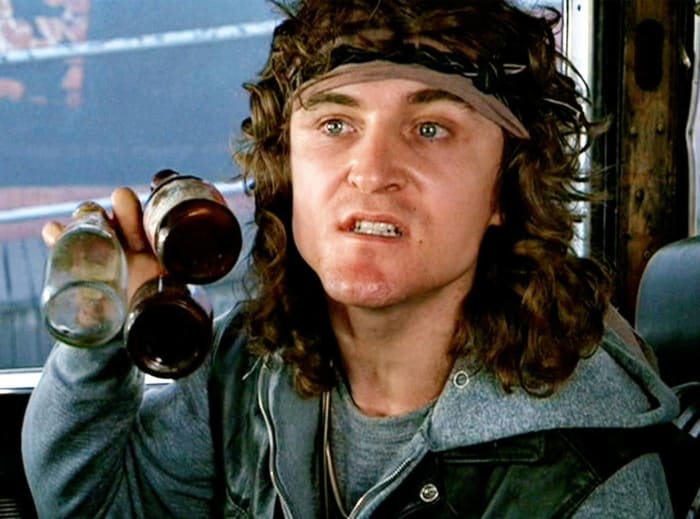
“Warriors… come out to plaaayaaay!” David Patrick Kelly sealed his character-actor fate as the duplicitous gang-leader Luther in “The Warriors”, and director Walter Hill liked him so much that he brought him back to play another Luther (or maybe the same guy) in “48 Hrs.” You might remember Kelly as Sully, whom Colonel John Matrix promised to kill last in “Commando." Perhaps you enjoyed him in “The Adventures of Ford Fairlane” as a pervert obsessed with "Josie and the Pūssycats." When David Patrick Kelly shows up in a movie, you’re getting a little something extra, and it’s always worth it.
Brion James

Brion James was a big, burly beast of a man. He could play the gentle giant when necessary, but when you call up his most iconic moments, you think of toughs like Karsthans in “Flesh + Blood," Detective Ben Kehoe in both “48 Hrs.” movies (wherein he went from good cop to corrupt cop) and, of course, doomed replicant Leon Kowalski in “Blade Runner” (“Wake up! Time to die.”). When James showed up in a movie, something bad was about to go down.
J.T. Walsh

A giant. Even when J.T. Walsh was playing an utterly despicable character (e.g. Sgt. Major Dickerson in “Good Morning America”), you were captivated by his cruelty. Walsh capably delivered the hissable goods, but he made you wonder why these guys were so hateful. A bad marriage or two? A big investment gone south? Hemorrhoids? He’s a ball of malevolence in “Red Rock West," “The Last Seduction” and “Backdraft," but he’s probably scariest as the wishy-washy studio exec Allen Habel in Christopher Guest’s “The Big Picture." Want to see how an adult drama can be reduced to a teen sex comedy in one pitch meeting? This is how it happens.
More must-reads:
Customize Your Newsletter
 +
+
Get the latest news and rumors, customized to your favorite sports and teams. Emailed daily. Always free!
PRIVACY POLICY EDITORIAL POLICY CONTACT US
ABOUT YARDBARKER TERMS OF SERVICE
Use of this website (including any and all parts and
components) constitutes your acceptance of these
Terms of Service and Privacy Policy.
This site is for entertainment purposes only.
There is no gambling offered on this site.
Gambling Problem? Call 1-800-Gambler.

